
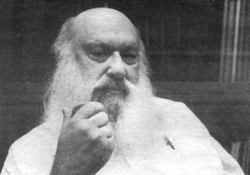
|


|

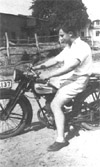 H.H. Jaffé as youngster
H.H. Jaffé as youngster© Dept. Chem., UCin. |
Jaffé:
Well, there is a key moment, though I can't tell you the exact
date - it must have been in the early thirties - 1934 maybe. My
mother came up with a mineral collection which she had as a
child. Marvelous stuff, beautiful pieces, bought in the best
shops for lots of money. But, of course, all the labels were
lost. She said, "You can't have this collection if you can't put
an order into it." So hardness and HCl tests got me into
chemistry. J: I understand that you began your studies at the Technische Hochschule in Berlin. Jaffé: Actually, I almost went to Zurich to study physics instead because at that point my interest was already on that borderline. If I could have gone to the ETH in Zurich, I would have been a physicist. |
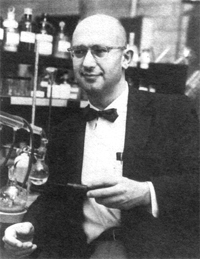 H.H. Jaffé, 1959
H.H. Jaffé, 1959© Dept. Chem., UCin. |
J: Both the Hammett equation and your work on the basicity of
organic molecules are essentially research themes that you
brought with you to UC. Did your interaction with Milt in
writing the books on spectroscopy and symmetry have much of
an impact in sparking your interest in the theory of electronic
spectra? Jaffé: Yes, I guess it did. It pushed me more toward spectroscopy. I think that's probably true. J: What is your feeling about the impact of those books? They were very influential in making the Department well known throughout the country. Jaffé: That's probably true. I was most pleased with our green book - the first one - Theory and Applications of Ultraviolet Spectroscopy. One day I was talking to O'Connell, one of the spectroscopists out of Chicago, and he said, "Now, you know that book of yours? Of course it isn't a spectroscopist's book, but when a new student comes to work with me, that's the first thing I give him to read." |
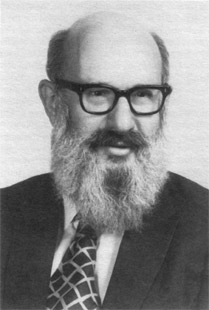 H.H. Jaffé, late 1960's
H.H. Jaffé, late 1960's Head, Dept. Chem., UCin. © Dept. Chem., UCin. |
J: Tell me about becoming Department Head. Jaffé: I had no ambition to become Head. Milt came to me (he was the chairman of the search committee) and asked me to write down what it would take for me to agree to become Head. I said I didn't want to be Head. Nevertheless I sat down and wrote out a set of demands which I thought would be so far beyond anything the administration would possibly agree to, that I would be safe. There were ten points, the tenth one of which was that I wanted the agreement on the other nine in writing. I made only one mistake. In my request for the TA {teaching assistant , note of this website} budget, I forgot that I needed two increments: one to increase the stipend and one to get the number of stipends up. So that one I missed. But basically, the departmental budget, other than faculty salaries, was doubled. I think administratively that was probably my biggest coup. There was no negotiation. The President called me in and said, "Sold." J: You initiated the position of Assistant Department Head. My impression is that you have always been careful to guard your creative freedom, be it from the encroachment of routine laboratory work at the Center for Venereal Diseases or petty administrative work. |
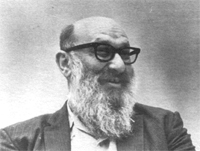 H.H. Jaffé, late 1970's
H.H. Jaffé, late 1970's © Dept. Chem., UCin. |
Jaffé: Oh, I don't know. That's hard to say. The three dings we talked about are the most important. The second one, the electronegativity stuff, is really Jürgen Hinze's and could never have been done without him, though it's mine too. It was really a cooperative thing. The CNDO? Well, Janet did the basic program, but most of the rest I did and redid. It's not really that wild. Ultimately, the review paper on the Hammett equation which I wrote in graduate school is my favorite. It has stood up and I was still getting reprint requests 20 years later. That paper also single-handedly introduced certain statistical mediods into organic chemistry. |
